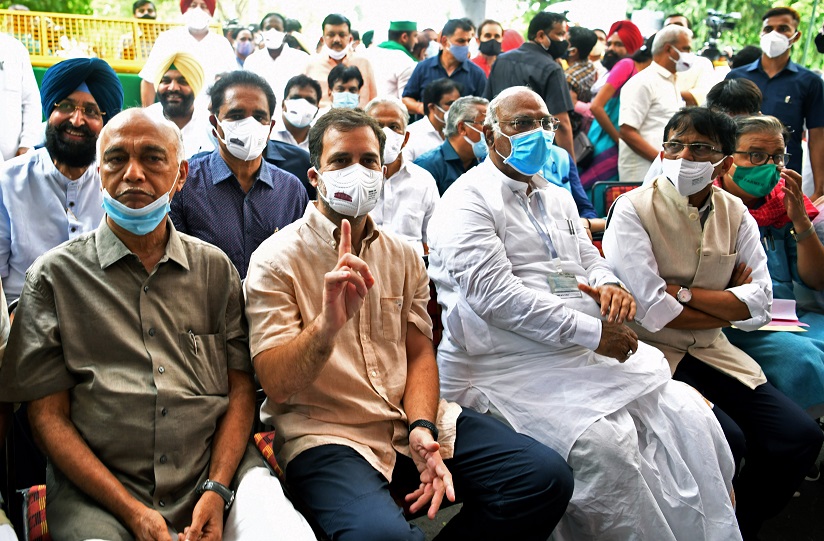Congress steals Trinamool’s thunder as a section of Opposition strives for synergy against BJP.
Mamata Banerjee strode into Lutyens Delhi in the last week of July as the victor of West Bengal. Taking a leaf out of Congress strategy in 1998, like Sonia Gandhi, who was then not an MP, Mamata had been elected head of her party’s parliamentary group—the ground was set for her presiding over a meeting of a potpourri of parties during the monsoon session of Parliament in pursuance of an extra-parliamentary agenda: projecting the Trinamool supremo as the alternate face to Narendra Modi. Chief Ministers usually visit New Delhi in regular intervals to interact with the Union government. Mamata is an exception. She filibusters the Centre from her perch in Kolkata. Her visit in July came after a gap of two years. She was accompanied by a team of journalists from her state, though all Kolkata publications have vibrant New Delhi bureaus. She made a “courtesy call” on the Prime Minister and spent her time meeting Opposition leaders. Having appointed the Lokur-Bhattacharya commission of enquiry into Pegasus snooping before embarking for New Delhi—she sought opposition synergy on the issue. She did not visit the agitating farmers on the borders of the capital though over the past eight months she had been providing lip service to their cause.
Her agenda, however, was hijacked by seemingly innocuous quarters. Shrugging off his reticence and aloofness Rahul Gandhi suddenly became hyperactive and began presiding over meetings with leaders of other parties. Trinamool stayed away from the jamboree initially but seeing the reach of the Congress outreach, quietly fell in line. Mamata returned to Kolkata without emerging as the “first among unequals”.
Trinamool’s election slogan, “Khela hobey” (we shall fight/game is on) has reverberated in New Delhi since the past week. However, the ball has been snatched away by Congress, which has effectively showcased Rahul Gandhi as a rallying point for the Opposition. In one stroke the talk that Congress has to play a supporting role in an anti-Modi front dissipated. A recouped Congress seems poised to play its role as the national Opposition—a corollary of its strength in Parliament, though its presence in the states has been dwarfed by regional outfits, mostly offshoots of Congress.
Since 21 June, when at the initiative of Trinamool’s vice president, Yashwant Sinha, a meeting was organised at Sharad Pawar’s New Delhi residence, talk of an “alternate vision” has been in vogue. As Congress stayed away from this meeting, Sharad Pawar, who has been nurturing ambitions in Lutyens Delhi since he lost out to P.V. Narasimha Rao in 1991, quietly withdrew from the game, citing that anti-BJP unity sans Congress was not tenable. Last heard was the meeting Pawar had with Amit Shah on 3 August to discuss pricing of sugar and ethanol blending with petrol—issues flagged by Maharashtra’s cooperative sugar lobby. Yashwant Sinha was not in sight when Mamata visited the capital. (The hope that Sinha will find a Rajya Sabha perch meanwhile having fizzled with Trinamool nominating bureaucrat Jawhar Sircar for the byelection.)
Mamata began her “Khela hobey” part 2 on 21 July—the anniversary of Left Front regime’s police firing on Youth Congress workers in 1993 (when she was in Congress). The annual Trinamool event was webcast and Sharad Pawar, P. Chidambaram, Digvijaya Singh and leaders of an assortment of parties watched her virtual rally sitting in capital’s Constitution Club. A fortnight later the same venue was used by Rahul Gandhi to host a working breakfast meeting of 15 parties, which included, among others, Trinamool and its archrival CPI(M). The oxymoron did not end there. While Trinamool was seeking synergy with Congress, in West Bengal and Tripura it was engineering defections from Congress ranks. The disparate desperate Opposition to the Modi regime was not camouflaged.
In the height of her glory Indira Gandhi was opposed by a “Grand Alliance” in 1971. After she recovered in 1980 from the Janata jolt, a series of Opposition conclaves were organised in a bid to oust her. She withstood the onslaughts. Four decades later Narendra Modi’s seemingly unassailable position has triggered unity moves among disparate forces whose only common agenda is to ensure that BJP does not return to power in 2024. In a democracy it is licit to seek a change of guard. The anti-Indira Gandhi experience in grand strategising had shown that anti-individualism does not take any political front forward. Ideology has to be the rallying point. Opposition for opposition’s sake can work only if the ruling dispensation is perceived as weak, or as in the case of Bofors, seen as being corrupt. In the present circumstances, the brouhaha and disruption on the floor of Parliament is depriving the Opposition of its cutting edge—of placing facts on record (if there be substance) and cornering the ruling party.
The ruling party ought to be accommodative—it need not be sensitive to criticism. It must marshal facts and have the conviction of being able to call a spade a spade. In the 1980s, during the debate on Kuo oil deal (the allegation traced wrongdoing to persons close to the Prime Minister’s household) K.P. Unnikrishnan mocked Indira Gandhi: “Madam, how do we ensure purity of the Ganga if Gangotri be polluted?” Unfazed, she shot back, “allegations of corruption are a world phenomenon” and went on to count cases ranging from UK Prime Minister’s spouse Dennis Thatcher to a Prince in Japan. Absence of categorical denial or winking at the controversy adds to the grist of the rumour mill. Five years after Indira Gandhi’s “world phenomenon” retort, Rajiv Gandhi’s inability to categorically deny Bofors allegations paved the way for the formation of V.P. Singh-led disparate regime, which, though short-lived, laid the foundation of the exit of Congress juggernaut from the Treasury Benches.
Rahul Gandhi has stolen Mamata’s thunder and brought synergy among some parties in the Monsoon session of Parliament. Will this bonhomie last? A battle of perception has begun. BJP seems unfazed.

